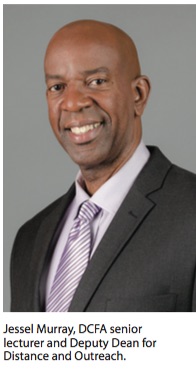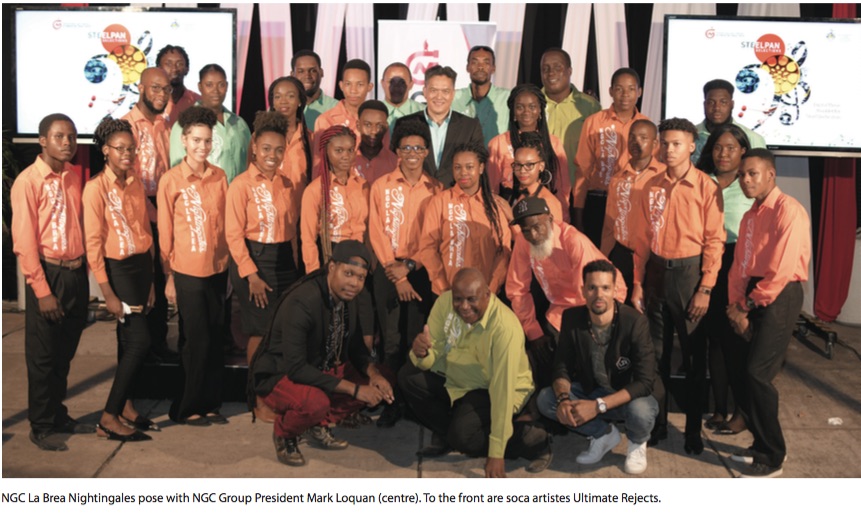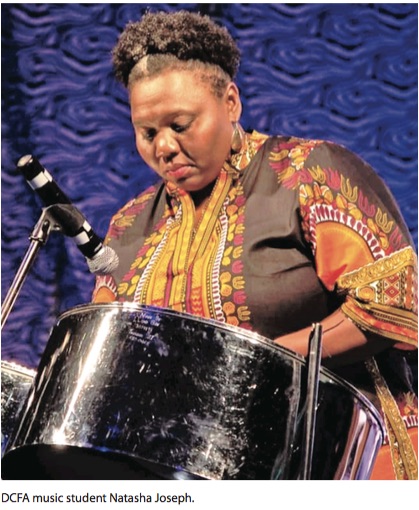UWI nurses conduct COVID-19 contact tracing on behalf of the Ministry of Health

One of the joys of attending Panorama, the world’s largest steel pan festival, is the chance to hear the arrangements of popular calypsos performed in distinctive styles of the different orchestras. Many a pan enthusiast has probably headed home humming these tunes. Enthusiastic musicians might want to take a shot at playing them.
There they might find themselves hitting an obstacle. Panorama could be the first and only time these renditions are heard by the public. After Carnival, the performances may never be played again or enjoyed only through video recordings.
Many pan performers and arrangers, although masters of their craft, are not trained in scoring or transcribing music. They cannot write the notes in a form which other musicians can read and replicate..
Jessel Murray, Deputy Dean for Distance and Outreach and Senior Lecturer at the Department of Creative and Festival Arts (DCFA), respects the tradition of arrangers calling out notes and of section leaders learning their part of the music and “distributing” it to the players – but it can be time consuming. “It can take about six weeks to develop these eight minutes of music,” he explains.
There is a solution. DCFA has partnered with the National Gas Company (NGC) on a project to score steel pan compositions for NGC sponsored bands - Couva Joylanders, La Brea Nightingales and Steel Xplosion. The St Augustine Centre for Innovation and Entrepreneurship (StACIE), through its Manager of Funds and Strategic Initiatives, Lois St Brice, served as the main conduit between The UWI and NGC.

Myles Lewis, Head of Corporate Social Responsibility at NGC explains, “A key NGC strategic pillar is that of strengthening its national contribution. Support for the national instrument is one of many ways in which we aim to do so.” NGC provided the funding while the DCFA provided the expertise.
DCFA Music student Natasha Joseph did a great deal of the leg work. She began visiting steel orchestras in 2019, recording several Panorama practice sessions. Then the process of scoring began.
Murray explains that scoring is transcription. “It’s taking music that is already present in an aural form... and making sure that it is captured on paper.” Joseph’s strong theoretical skills makes her one of the best people for this.
Using an advanced music notation system known as SILIEBUS, Joseph converted the recordings into files and scored the music. Once her tasks were completed, Senior Lecturer Dr Jeannine Remy listened to the recordings and made any necessary adjustments to the score. Satanand Sharma, Coordinator of the DCFA’s Music Unit, took charge of final edits.
The result is a resource of playable scores which anyone can use anywhere. In keeping with NGC’s goal of distributing music to performers at all levels, The UWI team not only created a professional version of the scores, but also renditions which could be played by secondary and primary school bands.
The work was not without its challenges. For example, one band that did not get past Panorama’s preliminary round had disbanded by the time the project began. It was difficult for them to meet, and The UWI team had to rely on less sophisticated recordings.
In the end though, six scores were produced, accessible through NGC’s website. Anyone can play Fire in the Area originally played by NGC Couva Joylanders, composed by Leston Paul and arranged by Stefon West. They can access Party Start by NGC La Brea Nightingales composed by Marvin “Swappi” Davis and The Ultimate Rejects, and arranged by Richard Gittens.
The benefit to the development of the steel pan could be considerable. Murray points out that “steel is one of the youngest instruments”. Since the repertoire of the music for it is still growing, we “must make our instrument as viable as possible”.
NGC President Mark Loquan looks forward to “a Trinidad and Tobago where pan lives beyond Panorama. Where bands play and audiences listen throughout the year, in concert halls and radio playlists, locally, regionally, and internationally.”

There are further plans for this project. Recordings were done for Panorama 2020 and are being scored. For Murray, the best possible outcome is for them to be played widely. NGC is also interested in introducing more innovation and sustainability to the industry. “It is our intent to continue to score our sponsored band’s music,” says Myles Lewis. “However, music literacy is a key component of our sponsorship. Ultimately we would love for this exercise to be done ‘in-house’ by the respective bands.”
Mark Loquan envisions a Trinidad and Tobago that is “a place of master pan makers, master pan tuners, accessible and in healthy supply, running competitive businesses which compel innovation in the craft. In that place, schools teach pan, but students can learn independently because they are literate in music and pan scores are readily available.”
As the repertoire of the steel pan grows, the distinctive sounds of these compositions could become an instrumental part of performances at venues around the world.